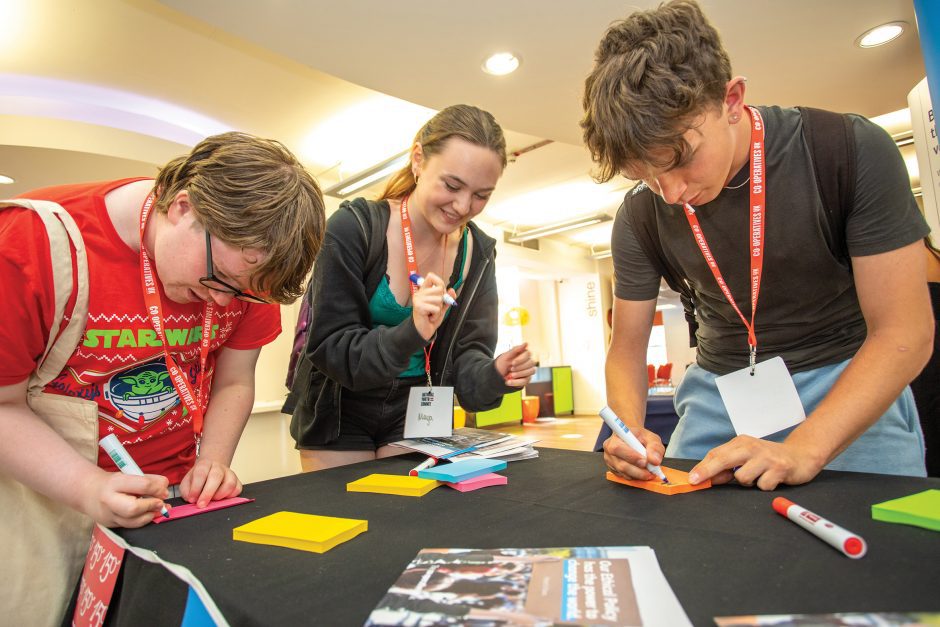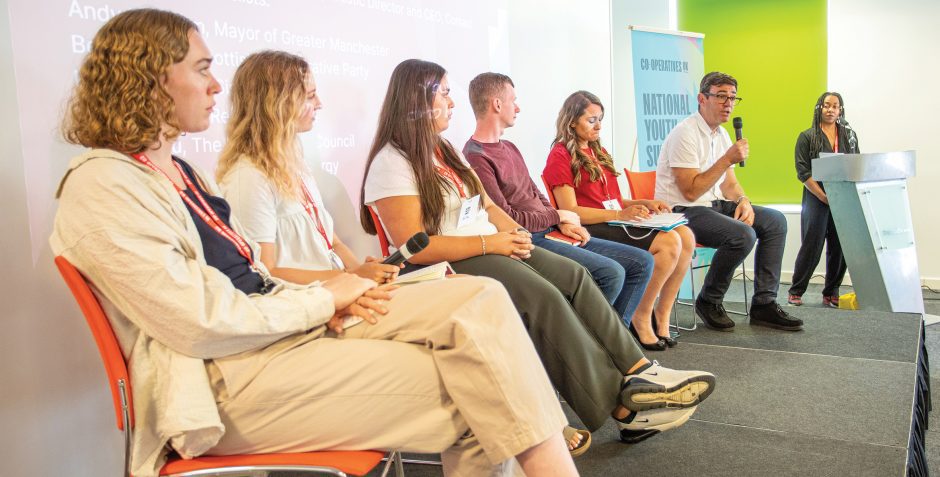Research released by Co-operatives UK earlier this year revealed some of the issues worrying young people – such as poor job opportunities, mental health and data privacy. Such a range of concerns is not surprising: young people are not a homogeneous group, as was pointed out at the apex body’s first National Youth Summit in July.
However, there was one topic of interest shared by the 16-30 year olds who gathered for the event in Manchester: co-operatives. Attendees ranged from co-op founders and members to those who had little to no prior knowledge of co-ops.
Co-operatives UK CEO, Rose Marley, opened the day with an apology: “I apologise that not enough young people know what a co-operative is, because there are solutions, and there is hope. Part of doing this is to get that word out there but also to ask you to help us with that mission.”

The day that followed included a social action workshop led by Dan Cox, UK project manager at the Co-operative College, who warned that social action means getting used to disappointment and failure, and called on people to shift gears from the long-term big picture to the immediate practical actions. “You need to be a giant,” he added. “You’ve got to have your feet on the ground and your head in the clouds.”
A conversation around how that action might be coordinated was facilitated by Dr Owen Powell from the Young Co-operators Network (YCN), a peer-to-peer network which supports young co-operators through outreach, friendship, collaboration and knowledge sharing.
Powell highlighted a need for more joined-up action around youth co-operation, citing a “broad lack of coherence regarding youth and young co-operators”. This, he said, includes among worker and consumer co-ops – exemplified by the fact that Midcounties Co-operative has its own youth initiative, also called the Young Co-operators Network.
The session looked at where the YCN could go next – from choosing its main activities to finding ways to broaden engagement and acquire funding. Participants discussed how the YCN could help unify different strands of youth activity across the UK movement.
Related: Co-op Group partners with UK Youth for social action in Scotland and Northern Ireland
In another workshop, Manchester sustainable clothing co-op Stitched Up explored the fashion industry’s impact on the environment. Fashion accounts for around 10% of greenhouse emissions from human activity. The session suggested more sustainable materials, such as cotton, which has a 50% lower carbon footprint than polyester. Participants were also given scraps of different textiles and asked to think about how these might be upcycled.
Meanwhile Ben Proctor, chair of the Scottish Co‑op Party, looked at the Bill of Rights introduced to the UK Parliament in June. The bill, which repeals and replaces the existing Human Rights Act 1998, has been criticised by lawyers and campaigners for leaving some people vulnerable to human rights violations. Participants expressed their views on a range of issues related to the Bill, such as whether giving UK courts the final say would be good or bad or whether free speech should be limited. They also explored the impact the Bill would have on refugees, the responsibility of public bodies and impunity for the armed forces.
The day also featured a workshop with the Woodcraft Folk, a session on community shares, a panel discussion about transport in Greater Manchester, media training from Co-op News and a look at student housing co-ops.
Related: Experiencing the co-op difference: Co-operative summer camps
The summit ended with a panel including Greater Manchester mayor Andy Burnham. In response to the session’s first question, ‘does democracy work in the UK?’, his answer was, in short, no. “Our system hands power to an incredibly small number of people who operate in and around Downing Street and the centre of government,” he said, arguing that around 100 people in Westminster run the country.

But Hannah Birch, chief operations officer at Revolver Co-op, believes politics is not the only space where democracy can be practiced “There is a place for democracy in the workplace,” she said. “I believe people should work towards something that they believe in.”
Birch added that democracy is at the heart of co-ops, and highlighted the principle of one member, one vote.
Shifting focus to local communities, Lenny Watson, founder of Sister Midnight community benefit society, advocated a grassroots approach to social change, “putting power and democracy back into the hands of ordinary working people, because that’s how we’re going to rebuild wealth and power in our communities”. She encouraged the young people in the room to join existing co-ops – and create new ones: “if there’s a thing that you care about or think your community needs, start a damn co-op and fix it!”
Related: Sister Midnight looks to create a grassroots music venue
British Youth Council trustee Sila Ugurlu said that learning about co-ops has given her hope: “It’s so amazing to see a group of young people that are aware of co-ops and are actively involved in them, because I think that they’re going to be one of the things that helps us in the future.”
Amelia Crews, energy innovation co-ordinator at Your Co-op Energy, highlighted the value of youth to the co-op movement – and the movement’s duty to the next generation. “I believe that it’s the duty of the leaders in the
co-op space to give us access where they can – and when they can’t, for co-operatives to empower young people to speak up, because we’re not going to fight all of these crises with the same people, the same thinking and the same systems that created them.”